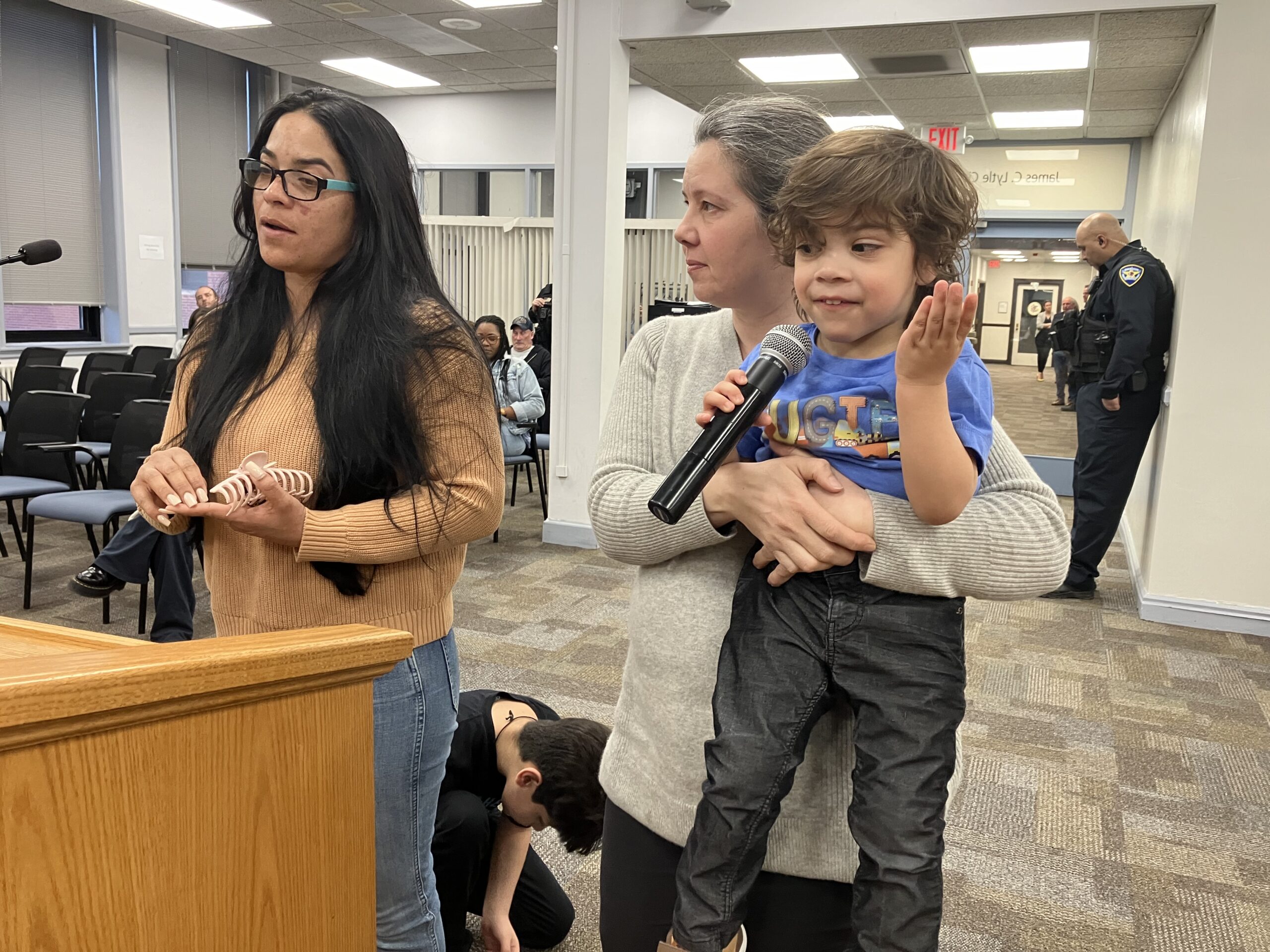By Bob Seidenberg
Members of a City Council committee held off Feb. 6 moving forward on an ordinance requiring employers to provide employees with predictable work schedules, including advance notice of changes.
Human Services Committee members voted to table until their March 6 meeting action on what would be the city’s first Fair Workweek ordinance, after fielding strong criticism from segments of the business community, questioning the basis for the requirements.
“What is the tangible data that indicates it is needed for small businesses?” asked Julie Matthei, the co-owner and Director of Business Operations at Hewn Bread, 1733 Central St., during the public comment portion of the meeting. “Have employees asked for assistance from the city with respect to hours and scheduling? I would love to see the evidence of this type of oversight, and know if it’s really needed in the Evanston small business community.”
Council member Devon Reid, 8th Ward, proposed the ordinance in an earlier referral lto the city’s Referrals Committee.
The ordinance would “provide workers in specific industries advance notice of schedules and schedule changes, the right to rest between closing and opening shifts, and also give them the first opportunity to work additional shifts (as opposed to hiring new, part time employees,” summed up Alison Leipsiger, the city’s policy coordinator, in a memo.
The ordinance would apply to a wide range of industries and work places that employ 15 or more employees, such as childcare, health care and hospitality facilities; restaurants, nursing homes and others.
Reid argued at the meeting that the ordinance seeks to protect the “right to predictability, the right to ensure that employers are giving their employees schedules two weeks in advance, so a mother can schedule parent-teacher conferences or a father can schedule taking their children to the doctor or to other visits.”
The ordinance also has the backing of Mayor Daniel Biss.
Biss, who does not serve on the Human Services Committee, appeared before the group at the Feb. 6 meeting to speak in support of the proposal. He said the issue is an important one at a time when there is a childcare crisis, pointing out that the proposal would offer workers protection against last-minute changes that would otherwise make childcare “impossible and unaffordable.”
To that, he added, “There’s a crisis, we’re told by physicians, with sleep in this country that’s taking away our attention and our capacity for empathy.”
Further, he pointed to also how the ordinance would address what’s referred to as “clopening” — requiring a minimum of 11 hours between shifts so workers can rest or sleep.
“And it [the proposal] does a number of important things,” he told committee members, “which is why ordinances and laws like this are being introduced — in fact, passing, in a number of communities all over the country.”
A collaborative and positive environment that already exists
But some speakers associated with Evanston’s most praised businesses, questioned the need for the changes in an already difficult business environment.
In her comments, Matthei told committee members, “If the City Council is determined to create an ordinance like this, then it should be amended to mirror the ordinance as it is written in Chicago, which affects businesses that employ 100 or more employees and exempts restaurants with less than 250 employees.
“As small business owners, we work directly with our co-workers every day,” she said. “It’s not an ‘us-versus-them’ mentality. We are in the trenches — not in an ivory tower.
“Go to any small business in Evanston and you will see the owners working side by side with employees because we care,” she said. “We care about our business, we care about our staff. We want to retain good people and provide everyone who works with us a collaborative and positive environment.”
‘Support needed rather than restrictions’: Morton
Similarly, Amy Morton, owner of the Barn and co-owner of LeTour restaurant and before that Found Kitchen and Social House, and a long time resident of Evanston, questioned the ordinance’s wide reach, noting that “especially since COVID, we have never had greater benefits” [for employees].
“We have chosen to create great benefits for our teams — whether they’re full or part time employees because we couldn’t get employees otherwise,” she told committee members. “And we still can’t get employees, and to have these rigid, insane restrictions put on small businesses is the farthest thing that is going to grow our community’s belief in each other, and our ability to be vibrant and alive.
“Even if we have a full, burgeoning busy downtown area and not have first storefronts empty, it still wouldn’t be a good idea,” she said. “This is something that needs to be focused on large businesses, and we as small businesses and community members need more support from the city rather than restrictions.”
Doomsday scenarios have not occurred: University of Chicago researcher
Susan Lambert, a professor at the University of Chicago, who has studied staffing and scheduling practices and the ramifications for workers for more than 20 years, spoke in support of the ordinance.
In 2017, Lambert told the committee, she studied the implementation of Seattle’s Fair Workweek law by a group of front end managers in the retail and food service.
A number of the businesses had a small number of employees, under 35, she said in her research
“Overall, in studying these kinds of the doomsday scenarios that have been raised by employers in many of these different cities, during the course of discussion of these laws, they just have not occurred,” she maintained.
She said, “One of the first lessons that we’ve learned is that there is certainly a learning curve. But setting the new work hour standards is feasible with what experienced managers can and most even like — for example, posting schedules further in advance, and eliminating changes to the schedule, even during the heart of COVID.”
Further, research has shown that “improving the predictability and stability of work schedules can be good for business’s bottom line.”
She also cited a randomized trial that she and colleagues conducted on stores in the broader Chicago area, including Evanston.
“And what we found is that improving work schedules for employees resulted in higher sales,” she said. Just as important, she added, “Rather than increasing labor costs, improving employee work schedules lowered labor costs, and our data was to show how this happened.”
She said establishing predictable schedules resulted in less tardiness and employee call outs of work, forcing co-workers to stay longer, also reduced budget costs.
“These costs cascade throughout the day and across weeks,” Lambert said, “and they add up to significant increase outlays for labor.”
In discussion of the issue, Council member Eleanor Revelle 7th Ward, expressed surprise “that we are applying it [the proposal] to businesses of only 15 employees, whereas most of the Fair Workweek laws around the country seem to be aimed at much larger workforces, and particularly chain stores.”
She said there are a number of good points in the proposal, “but I really think we need more conversation with our small business community, in particular, to really make this work for everybody.”
Council member Juan Geracaris, 9th Ward, chairing the meeting, said he was surprised how negative the response has been to the proposal. “I’m also struggling to find out what the sticking points are.”
He and other committee members differed over tabling the issue for more discussion, or sending it the full Council, where the proposal would be introduced and then voted on it two weeks.
Reid favored moving the issue to the Council, maintaining concern about small businesses being included in the ordinance was the only contention he had heard raised.
“But what is it in the ordinance, Reid asked, “specifically which one of the provisions is it that folks don’t want to have to follow? And that’s what I’d like to hear, not just that we want to exclude small businesses because it’s too onerous on them.
“It’s too onerous on workers,” he said. “What about the employees that work at these businesses,” he asked, “and have to be submitted to some of these unfair practices?”
Speaking next, Revelle broadened her suggestion for follow up to include the different industries that would be affected by the changes.
Council member Bobby Burns, 5th Ward, supported keeping the issue in committee, and receiving more feedback, but “I think we need to go further than just include small businesses. I think we need to know why (for the opposition). I think we need to know exactly where the pain points are.”
Some of the concerns, he pointed out, are similar to what the last City Council heard concerning passing a higher minimum wage.
“Remember, there were a lot of small businesses that came out, some of which I know well, and most of us know well, who were saying that too would affect small businesses,” he said.
In a unanimous vote, committee members voted to table the issue until next month’s Human Services Committee meeting.




